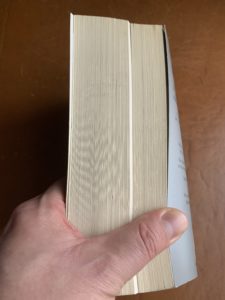What is the ideal length for a book?
 Ah, this old chestnut. Discussion amongst writers, agents and publishers (but rarely readers, I find) often swings around to word count. How long should a book be? Has this changed over the years, and, if so, why?
Ah, this old chestnut. Discussion amongst writers, agents and publishers (but rarely readers, I find) often swings around to word count. How long should a book be? Has this changed over the years, and, if so, why?
Firstly, this will depend on the type of book (fiction/non-fiction/narrative non-fiction) as well as the genre. Each category has, over time, been pegged with certain word lengths determined by industry insiders attempting to gauge audience wishes and expectations. For the sake of this article, let’s talk about fiction books. There was a post recently doing the rounds on social media that I found interesting, where a New York-based literary agent advocated a ‘suggested word count chart’ published by Writer’s Digest.
In short, the suggestions ran as follows:
Below 70,000 – you’re too short
70-80K – it’s ok, may be short
80-90K – sweet spot
100-110K – probably ok, might be long
110k+ – unless you’re sci-fi or fantasy, you’re too long.
The post gained a fair bit of traction, with many stating that these word counts are too long and need refining. Chris Black, Senior Editor of indie publisher Fahrenheit 13, responded by saying: ‘Harsh. I’ve known plenty of greats in the 50-60K range. Take 40k off each category and it’s about right.’ Other comments such as ‘Love a nice tight story’ and ‘60-65k is gold’ were also commonplace.
I must say I sided with this view. Modern readers now have their book reading time seriously compromised by the constant consumption of the (entirely relevant and individually defined) information available on their mobile phone, as well as other bespoke entertainment options such as Netflix. Not to mention, in many cases, increased commuting times – and for those outside of London, that means driving. Few people have many chances to regularly sit down and read big chunks of a work at a time. To suggest below 70,000 is too short is crazy, especially in my preferred genres of crime/noir/mystery.
Some of my favourite contemporary writers such as Ken Bruen and Scott Phillips are often in the 60-70,000 range and sometimes below that. It’s also easy to forget that many classics didn’t subscribe to the ‘big is best’ theory. A Clockwork Orange was approximately 59,000 words long, while Ian Fleming’s debut Bond novel, Casino Royale, came in at 44k. Try these others for size: The Big Sleep (55k), The Spy Who Came in From the Cold (61k), The Great Gatsby (48k), Fight Club (49k), The Hitchhiker’s Guide to the Galaxy (47k).
I enjoy a sprawling James Ellroy as much as anyone, but if I want to get through 15-20 books a year to give myself a variable literary experience, I need plenty of reads where brevity was the author’s watchword.
There is too much emphasis within the publishing industry (I’m mainly looking at the big 5 here) on length, and conforming to the belief that readers associate a thick book with value for money. Are they really that bothered? The ones I speak to aren’t; they just want something they feel they’ll enjoy. A blurb with a strong hook is surely more powerful than bulkiness?
The same could be said for films. Want to plan the rest of your day around watching a new movie? Most of them are over two hours now, many towards or over three, as the companies want to justify the rising cinema ticket prices. I’m a big 90-minute fan. I want the story to be the experience, not the ‘cinematic experience’ to be taking up half my day with ads, trailers and a bloated main feature.
Going back to social media, I see many posts from writers (new and established) who are putting themselves under pressure by tracking their progress purely to word counts. ‘Phew, 5,000 words done today, target met!’
Yes it’s important to gather momentum when taking on such a sizeable project, but bashing out words for the sake of numbers can lead down a dangerous path. While the saying of ‘you can’t edit a blank page’ is obviously true, editing 5,000 crap words can take a whole lot longer than focusing on quality from the start. I’d rather spend a day writing 500 beautiful words than 5,000 churned-out ones.
Word counts are still important because they serve as a guide to how much of our investment, in terms of time, is required. However, don’t let this detract from more powerful factors such as organic pacing and storytelling. If you’re penning a novel, just focus on telling the story you want to tell in the first draft and consider those marketing-based word-count formulas later if you must. If you’re a reader, just continue enjoying the stories.
